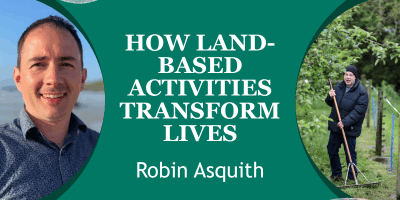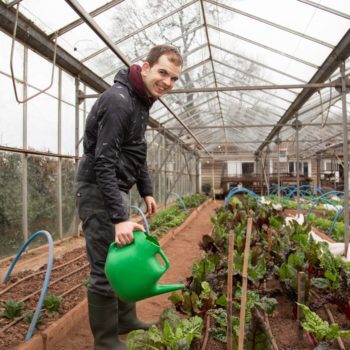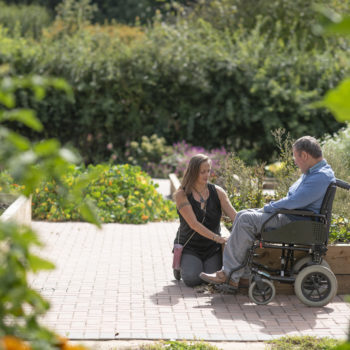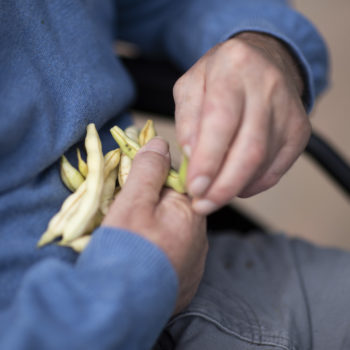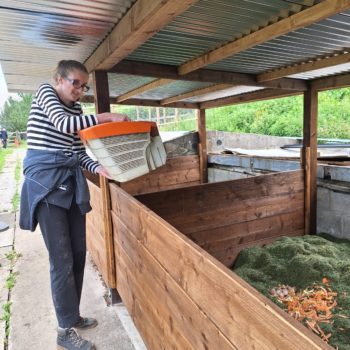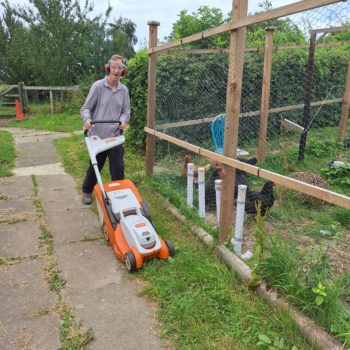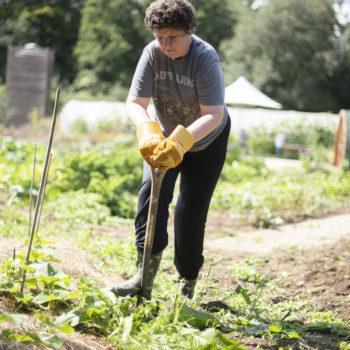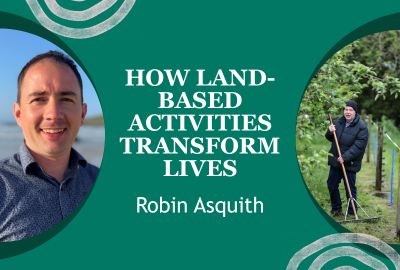Exploring Nature-Based Therapies and Skills at Camphill Village Trust
At Camphill Village Trust, our Nature-Based Therapies and Skills Programme is rooted in the belief that meaningful connection with the natural world can transform lives. Robin Asquith, Head of the Natural Environment, shares insights into how land-based activities are helping people with learning disabilities, autism, and mental health problems thrive.
- Robin Asquith
A role grounded in nature
I play a pivotal role in connecting Camphill Village Trust’s estates with its Nature-Based Therapies and Skills Programme. Under my leadership, our farms, gardens, and green spaces are not only carefully managed but also transformed into dynamic environments for personal development and well-being. With over 16 years of experience delivering land-based support, I am widely recognised as an expert in the field. I have a deep commitment to nature’s restorative potential which inspired me to travel the world in 2016, studying best practices in social farms and gardens across diverse cultures and settings. Today, I continue to champion opportunities for people to engage meaningfully with the land in ways that promote healing, purpose, and growth.
Activities that grow more than crops
Participants in our Nature-Based Therapies and Skills Programme take part in a wide range of land-based activities—from horticulture and food growing to countryside management and conservation. In the Trust we called these land-based programmes Social Farms and Gardens. Social farming is an innovative and inclusive approach that blends agricultural activity with social care, education, and therapeutic support. It offers individuals, particularly those with learning disabilities, mental health problems, or autism, the opportunity to engage meaningfully in the everyday life of a working farm and/or garden.
Unlike clinical or institutional settings, social farms remain authentic and operational, providing a non-clinical environment where participants can build confidence, develop skills, and foster social connections. Unlike traditional day services, these activities are immersive and hands-on, offering real-world skills and a sense of contribution. The concept is grounded in what I term multifunctional agriculture, where food production is combined with broader social care. Activities typically range from animal care, gardening, and conservation work to indoor tasks such as baking, jam making, and crafts. That means tasks can vary from milking the cows, watching the vet carry out work with the animals, to sowing, looking after and harvesting crops. These experiences are tailored to individual interests and abilities, promoting wellbeing and inclusion through structured, purposeful engagement.
Skills for life
Through these activities, people acquire practical skills like planting, harvesting, and using tools, along with personal development in areas such as teamwork, communication, and resilience. A huge focus is placed on the social aspect of placements too, allowing people simple learning experiences of making their own drink, to building confidence socialising with others. The rhythm of the seasons and the tangible results of their work help build confidence and independence. The Programmes also draw on experiential learning theory, notably the work of David Kolb, which emphasises learning through doing. For people with diverse needs, abstract instruction can be limiting. In contrast, hands-on activities—such as planting crops or managing livestock—create real learning experiences that build confidence, competence, and independence. These tasks are not symbolic; they are real, purposeful contributions to the community, reinforcing a sense of purpose and value.
The power of nature
Spending time outdoors has profound benefits. Nature offers a calming, sensory-rich environment that supports mental wellbeing and emotional regulation. Being in green spaces can reduce anxiety, improve mood, and foster a sense of belonging—especially important for those who may struggle in more conventional settings. Nature offers a sensory-rich, non-judgmental environment that supports emotional regulation, reduces anxiety, and fosters a sense of safety and belonging – fundamentally, animals and plants do not judge you based on preconceived opinions or ideologies. I have seen firsthand the power animals can bring, watching individuals interact with animals so easily when they struggle to do so with humans. I have always advocated the term – leave the diagnosis at the gate – the meaning is even though as care professionals we are fully aware of a person’s background and diagnosis; we don’t let this define how we support them. We treat each other as equal co-workers, using the land, animals, and nature as the vehicle for delivering support, development, and learning.
The theory behind the practice
Nature-based therapy is backed by growing evidence. Theories such as biophilia suggest humans have an innate connection to nature, and engaging with it can enhance cognitive and emotional health. Activities like growing and land stewardship also support learning through doing, which is especially effective for people with diverse needs. Ethically, Nature-Based Therapies and Skills resonates with Joan Tronto’s ethics of care. Tronto’s principles—attentiveness, responsibility, competence, responsiveness, and solidarity—are deeply embedded in the Nature-Based Therapies and Skills ethos. Participants are not passive recipients of care; they are active stewards of the land, supported by a community that values their contributions. These reframing challenges traditional models of support and affirms the dignity and capability of every individual. An example of this would be participants helping to shape the farm/garden seasonal plan, choosing signage designs, or mentoring newer members.
Looking ahead
These Programmes are a vital part of Camphill Village Trust’s wider mission to support people to lead connected, meaningful lives.
As interest in nature-based approaches grows, I see exciting potential for expanding these offerings—integrating more community involvement, seasonal projects, and even research partnerships to deepen impact.

